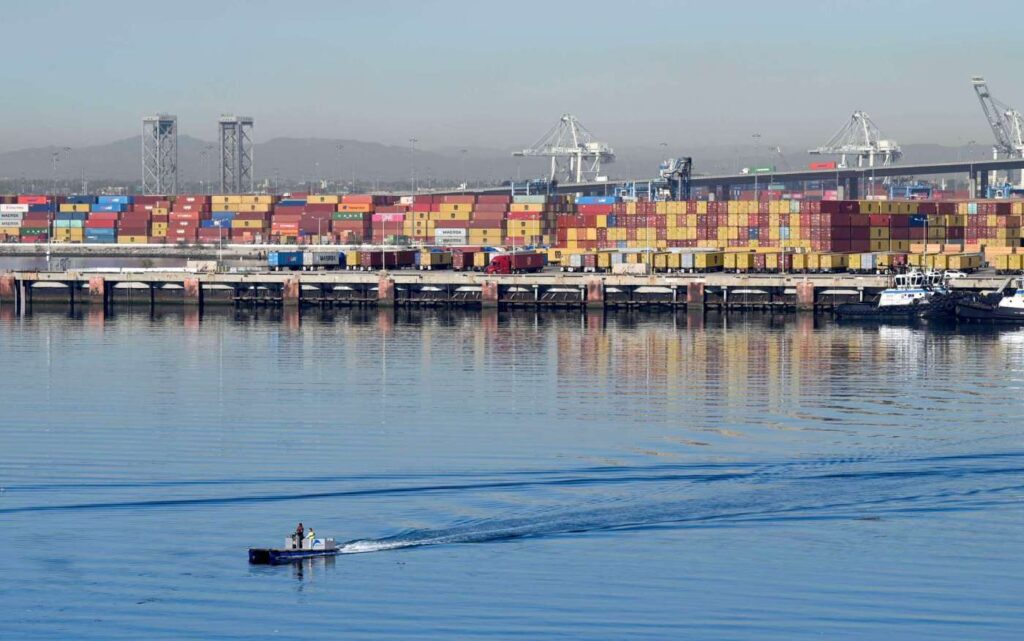
Three-quarters of rank-and-file membership with the International Longshore and Warehouse Union approved a new six-year labor contract, the ILWU announced Thursday, Aug. 31, ending one of the longest negotiation periods in the union’s history.
Employers, represented by the Pacific Maritime Association, had already approved of the contract.
The six-year contract will expire on July 1, 2028. Details of the agreement have not been officially released, but media reports have said pay will go up 32% and bring dockworkers $70 million in bonuses over the course of the agreement.
“The negotiations for this contract were protracted and challenging,” said ILWU International President Willie Adams. “I am grateful to our rank-and-file for their strength, to our Negotiating Committee for their vision and tenacity, and to those that supported giving the ILWU and PMA the space that we needed to get to this result.”
Jim McKenna, PMA’s president and CEO, also lauded the deal in a written statement.
“This contract provides an important framework for the hard work ahead to overcome new competitive challenges and to continue to position the West Coast ports as destinations of choice for shippers worldwide,” he said. “From San Diego to Bellingham, these ports have long been the primary gateways for cargo coming into and leaving the United States, and our interests are aligned in ensuring they can effectively, and efficiently, handle the capacity growth that drives economies and jobs.’’
Responses from the ports and lawmakers from both Long Beach and Los Angeles were swift as soon as the bulletin was sent out by the union Thursday afternoon..
Mayors Rex Richardson and Karen Bass, of Long Beach and LA, respectively, congratulated both sides for reaching a long-term agreement that benefits 22,000 workers at 29 West Coast ports, saying the agreement was “vital for the prosperity of both cities and the nation.”
“”This agreement is a win for the working people of our cities and for the ports of Los Angeles and Long Beach,” they said in a joint statement. “Labor stability is critical to the success of the San Pedro Bay Port Complex, which moves nearly 40% of the nation’s containerized cargo. Together, the two ports handle more than $400 billion in trade that reaches all 435 Congressional districts and support 1 in 5 jobs in Long Beach and 1 in 9 jobs in Los Angeles.”
Others were also quick to weigh in:
“Congratulations to the ILWU workers for ratifying an agreement with the Pacific Maritime Association,” U.S. Rep. Robert Garcia, D-Long Beach, posted X, formerly known as Twitter. “The contract supports good paying jobs, lifts wages, and protects pensions. Let’s keep America’s cargo moving.”
Los Angeles Councilmember Tim McOsker, who represents the Los Angeles port and San Pedro-Wilmington communities, also said the contract is good for the ports and surrounding areas — and for workers.
“Union strength comes from dedication, numbers and strong leadership,” he said. “This contract respects the hard-work and skill of our dockworkers, and their importance to our San Pedro Bay complex.”
Port officials, including LA harbor commission President Lucille Roybal-Allard and POLA Executive Director Gene Seroka, issued statements congratulating the ILWU and PMA as well. The former noted how longshore workers went to their jobs and helped move necessary goods throughout the coronavirus pandemic. The latter said the agreement will bring needed stability as the San Pedro Bay Comples works to regain cargo volume lost to ports on the East and Gulf coasts.
“This contract brings long-term stability and confidence to our customers,” Seroka said, “as we re-double our efforts to bring more cargo back to the Port of Los Angeles, the premier gateway to and from the Pacific Rim.”
Port of Long Beach CEO Mario Cordero agreed.
“The contract ratification will have a hugely beneficial impact to the U.S. economy, which depends on our ports and the trade they facilitate,” Cordero said in a written statement. “This contract will pave the way for the San Pedro Bay ports complex to competitively and sustainably keep the nation’s cargo and the nation’s economy moving.”
